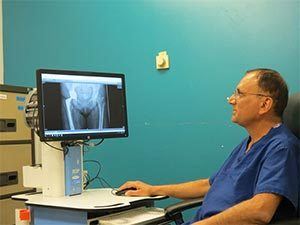Computer-assisted Hip Replacement Surgeon in Manchester, Cheshire
Arthritis or certain medical conditions may damage the bones in your hip leading to chronic pain in the joint. The damaged hip joint can be treated by replacing it with artificial devices using computer guided minimally invasive surgical procedure. Mr. Sanat Shah, Hip and Knee Specialist provides expert diagnosis and computer-assisted hip replacement surgery in Manchester, Cheshire. Mr. Sanat Shah, Hip and Knee Specialist also provides highly specialised care during and after the surgery. Contact Mr. Sanat Shah, Hip and Knee Specialist’s team for an appointment today!

What is Computer-assisted Hip Replacement?
Computer-assisted hip replacement is an image-guided, minimally invasive surgical procedure to replace your diseased or damaged hip with an artificial device using the assistance of computer software. The system creates and displays images and provides information that aids your surgeon at various stages of the procedure to improve accuracy and results.
Components of the Computer-assisted System
The computer-assisted system has three basic components:
- A special navigation camera that visualises your hip joint and creates images
- Smart instruments that can be tracked by the camera
- Computer with specialised surgical navigation software to integrate the images with surgical information
Advantages of Computer-assisted Hip Replacement
Some of the potential advantages of computer-assisted hip replacement include:
- Better accuracy in sizing and positioning of your hip implant
- Improved functional outcome and stability
- Improved durability of the implant
- Reduced risk of leg-length discrepancies
- Minimal postoperative pain
Procedure for Computer-assisted Hip Replacement
Computer-assisted hip replacement is performed in the following manner:
- Spinal anaesthesia is administered
- The smart instruments are introduced into the hip and specific anatomic bony landmarks are located with the help of the camera
- This information is relayed to the computer which generates a virtual model of your hip joint and provides information to help your doctor plan and perform the surgery
- The appropriate implant size is determined and your doctor makes precise cuts in your bone to place the implant in the desired position
- The instruments are removed and the incisions are closed with sutures
Your operation may take one to one and a half hours depending on the complexity.
Post-surgery Protocol and Care
After your operation, you will be closely monitored for several hours and will remain in the hospital for a few days. Usually, you are encouraged to sit and stand a day after your surgery and will start walking with a walker and then a cane over the next few days. You may be discharged when you can ambulate well with the help of a cane and are advised about:
- Postoperative precautions
- Post-surgery exercises
- Follow-up
Recovery After Computer-assisted Hip Replacement
In about four to six weeks, you should be able to walk on your own. It may take you a few months to achieve full recovery.
Potential Complications Associated with Computer-assisted Hip Replacement
Complications of computer-assisted hip replacement are very rare (less than 1%). The pins used to attach the smart instruments to the bones in the hip can occasionally undergo fracture or cause infection. Other complications include:
- Dislocations (rarely)
- Nerve or vascular damage
- Clot formation
If you would like to have additional information on the treatment of damaged hip joint or would like to learn more about computer-assisted hip replacement, please contact Mr. Sanat Shah, Hip and Knee Specialist, serving the communities of Manchester, Cheshire.

